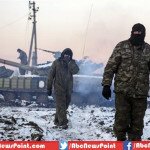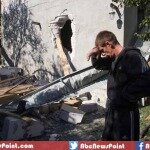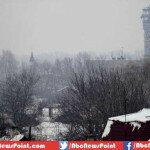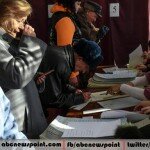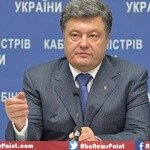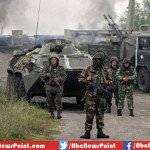Ukraine And Pro-Russian Rebels Continue Their Exchanges Of Prisoners
Kiev and pro-Russian separatists were to continue Saturday massive prisoner exchange began the day as part of an agreement reached this week at the peace talks in Minsk who have failed to resolve the substantive dispute and have since been in the impasse.
Friday, both sides had exchanged hundreds of prisoners that began in groups of ten near the town of Kostiantynivka (45 km north of the rebel stronghold of Donetsk). He covered a total of 222 –Men and women– Ukrainian soldiers and 146 rebels, according to an AFP journalist.
The prisoners, civil and carrying bags, lined in rows facing each other, 100 meters away.
Several representatives of the OSCE (Organization for Security and Co-operation in Europe) observed the scene, which took place in the dark on a road lit only by a few car headlights.
I am happy to go home to see my parents and my wife do not know yet I am free, he told AFP Siourik Artem, 28, a doctor of the troops of the Interior, captured there four months.
I just want to eat fried eggs and talk to my parents, joked his side Balboukov Denis, a freed rebel, aged 21, committed to fight again.But not all return the Ukrainian side. One of them, Alexei Samsonov, who fought in the Ukrainian army, says that since he was born in Russia, he wants to return to his homeland.
Prisoners presented by the rebels were held in the Donetsk region, said the separatist representative, Daria Morozova. According to her, the exchange of five prisoners from the neighboring breakaway republic Lugansk scheduled for Saturday.
The massive prisoner exchange is the only tangible agreement reached Wednesday during talks between the Contact Group composed of representatives of Kiev, Moscow and the OSCE, and pro-Russian separatists. Further negotiations were scheduled for Friday in Minsk, but has not taken place.
The insurgents demanded especially the resumption of funding for areas under their control cut by Kiev in mid-November and a special status” giving more autonomy to the regions of Donetsk and Lugansk.
This status was the Agreements signed in Minsk in September. But according Kiev and the West, the rebels have undermined these agreements by organizing early November election denounced by the international community and the Ukrainian authorities seek annulment.
The earliest Minsk talks in September were aimed at ending a conflict that has left more than 4,700 dead in eight months.
Sign ambient nervousness, Kiev and rebels accused each other of wanting to undermine the peace process. The leader of the breakaway republic of Donetsk, Alexander Zakharchenko, has estimated Thursday that Kiev was trying to derail the peace negotiations and prepared a major offensive.
The news agency Interfax-Ukraine, usually well informed on the position of the Ukrainian negotiator, former President Leonid Kuchma, reported Thursday that the rebels were looking for them to review the peace agreements previously reached in Minsk.
The self-proclaimed republics of Donetsk and Lugansk were represented Wednesday by incompetent people who do not make decisions and are not aware of previous agreements, he told a source close to the negotiations cited by the agency.
Russia for its part, noted the international tensions of recent months Friday by publishing an updated version of its military doctrine, which clearly condemns NATO as a fundamental threat to the security of the country.
The text approved by the Russian President Vladmir Putin, thus concerned strengthening NATO offensive capabilities directly to Russian borders, referring to the positioning by the Alliance troops in Poland and the Baltic States.
Moscow had threatened to react if accession of Ukraine to NATO after the symbolic abandonment Kiev status of non-aligned countries. The new Russian military doctrine also repeated that Moscow reserves the right to use its nuclear arsenal in case of threat to the very existence of? State.
While political dialogue is deadlocked, Kiev announced Friday it was suspending, for safety reasons, all trips by train and bus to the Crimea, ten days after Russia stopped its own rail service to the peninsula it has annexed in March. Its inhabitants can no longer reach by car Ukraine and Russia on board a ferry or a plane.
At the same time, US companies Visa and Mastercard payment systems have warned they stopped issuing their cards in the Crimea, in the wake of US sanctions against the peninsula.
The peninsula of the Black Sea, still very dependent on Ukraine for its water and electricity supply, was also deprived of power for several hours Friday.
These measurements are interpreted by some commentators as a deliberate from Kiev to strengthen its positions in Minsk negotiations.










